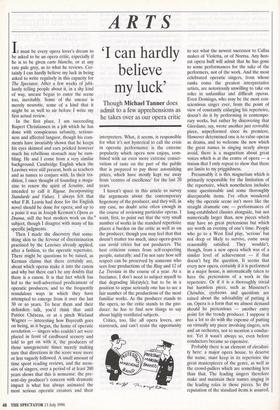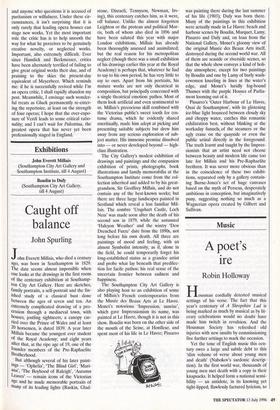ARTS
`I can hardly believe my luck'
Though Michael Tanner does admit to a few apprehensions as he takes over as our opera critic It must be every opera lover's dream to be asked to be an opera critic, especially if he is to be given carte blanche, or at any rate pale grey, as to what he reviews. Cer- tainly I can hardly believe my luck in being asked to write regularly in this capacity for The Spectator. After a few weeks of jubi- lantly telling people about it, in a shy kind of way, unease began to enter the scene too, inevitably. Some of the unease is merely neurotic, some of a kind that it might be as well to air before I write my first actual review.
In the first place, I am succeeding Rupert Christiansen in a job which he has done with conspicuous urbanity, serious- ness and affected languor, though his com- ments have invariably shown that he keeps his eyes skinned and ears pricked however much his rebellious stomach may be rum- bling. He and I come from a very similar background, Cambridge English when the Leavises were still present, both as teachers and as names to conjure with. In their tra- dition, I once thought of founding a maga- zine to renew the spirit of Scrutiny, and intended to call it Rigour, Incorporating Standards and Values. I always felt that what F.R. Leavis had done for the English novel should be done for opera; and up to a point it was in Joseph Kerman's Opera as Drama, still the best modern work on the' subject, though I disagree with many of his specific judgments.
Then I made the discovery that some- thing akin to the fervour of discrimination practised by the Leavises already applied, after a fashion, to the operatic repertoire. There might be questions to be raised, as Kerman claims that there certainly are, about which operas make it into the canon and why but there can't be any doubts that there is a canon. It is that fact which has led to the well-advertised predicament of operatic producers, and to the frequently scandalous ways in which they have attempted to emerge from it over the last 30 or so years. To hear them and their defenders talk, you'd think that until Patrice Chereau, or at a pinch Wieland Wagner — interesting how Bayreuth goes on being, as it began, the home of operatic revolution — singers who couldn't act were placed in front of cardboard scenery and told to get on with it, the producers of those unregenerate times merely making sure that directions in the score were more or less vaguely followed. A small amount of time spent reading reviews, and the mem- oirs of singers, over a period of at least 200 years shows that this is nonsense; the pre- sent-day producer's concern with dramatic impact is what has always animated the most serious operatic creators and their interpreters. What, it seems, is responsible for what it's not hysterical to call the crisis in operatic performance is the extreme popularity which opera now enjoys, com- bined with an even more extreme conser- vatism of taste on the part of the public that is prepared to pay those astonishing prices, which have mostly kept me away from 'centres of excellence' for the last 20 years.
I haven't space in this article to survey the arguments about the contemporary hegemony of the producer, and they will, in any case, no doubt arise often enough in the course of reviewing particular operas. I want, first, to point out that the very small number of works in the standard repertoire places a burden on the critic as well as on the producer, though you may feel that that doesn't matter too much, since opera-goers can avoid critics but not producers. The best criticism comes from self-respecting people, naturally; and I'm not sure how self respect can be preserved by someone who sees four productions of the Ring and 12 of La Traviata in the course of a year. As a freelance, I don't need to subject myself to that degrading life(style); but to be in a position to argue seriously one has to see a fair number of the productions of the most familiar works. As the producer stands to the opera, so the critic stands to the pro- ducer; he has to find new things to say about highly ventilated subjects.
Critics, too, like all opera lovers, are starstruck, and can't resist the opportunity to see what the newest successor to Callas makes of Violetta, or of Norma. Any hon- est opera buff will admit that he has gone to some performances for the sake of the performers, not of the work. And the most celebrated operatic singers, from whose ranks come the greatest interpretative artists, are notoriously unwilling to take on roles in unfamiliar and difficult operas. Even Domingo, who may be the most con- scientious singer ever, from the point of view of constantly enlarging his repertoire, doesn't do it by performing in contempo- rary works, but rather by discovering that Giordano, say, wrote another just revivable piece, unperformed since its premiere. However determined one is to value operas as drama, and to welcome the new which the great names in singing nearly always avoid, there is a magnetism about great voices which is at the centre of opera — a truism that I only repeat to show that there are limits to my priggishness.
Presumably it is this magnetism which is primarily responsible for the limitation of the repertoire, which nonetheless includes some questionable and some thoroughly disreputable items. I've often wondered why the operatic scene isn't more like the straight dramatic one — performances of long-established classics alongside, but not numerically larger than, new pieces which may have no great pretensions but which are worth an evening of one's time. People who go to a West End play, 'serious' but not deep or likely to survive, come away reasonably satisfied. They wouldn't, though, from a new opera which was of a similar level of achievement — if that doesn't beg the question. It seems that every new opera, certainly if it is performed in a major house, is automatically taken to have the pretensions of a work in the repertoire. Or if it is a thoroughly trivial but harmless piece, such as Massenet's Cherubin, eyebrows and questions are raised about the advisability of putting it on. Opera is a form that we almost demand should be pretentious — another entry point for the trendy producer. I suppose it has a lot to do with the expense of putting on virtually any piece involving singers, sets and an orchestra, not to mention a conduc- tor. Yet it wasn't always so, even before conductors became so expensive.
Probably there is an element of circulari- ty here: a major opera house, to deserve the name, must keep in its repertoire the great masterpieces of the genre, as well as the crowd-pullers which are something less than that. The leading singers therefore make and maintain their names singing in the leading roles in those pieces. So the reputation of the standard items is assured,
and anyone who questions it is accused of puritanism or wilfulness. Under these cir- cumstances, it isn't surprising that it is only rarely that leading opera houses can stage new works. Yet the most important role the critic has is to help smooth the way for what he perceives to be genuinely creative novelty, or neglected works. Important, also extremely difficult. Ever since Hanslick and Beckmesser, critics have been alternately terrified of failing to give great original works their due, and of praising to the skies the present-day equivalent of Meyerbeer. Which reminds me: if he is successfully revived while I'm an opera critic, I shall rapidly abandon my post. Meanwhile, I envisage such wonder- ful treats as Gluck permanently re-enter- ing the repertoire, at least on the strength of four operas; I hope that the over-expo- sure of Verdi leads to some critical ratio- nality; and I can't wait for Palestrina, the greatest opera that has never yet been professionally staged in England.



































































 Previous page
Previous page